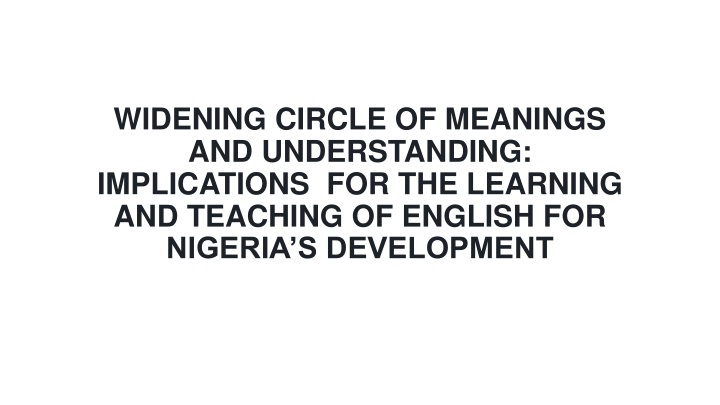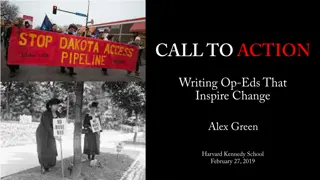
Implications of English Language Teaching and Learning for Nigeria's Development
Explore the implications of widening the circle of meanings and understanding through the learning and teaching of English for Nigeria's development. Delve into the role of English in Nigeria's multilingual context and the challenges faced in communicating diverse meanings effectively in the medium of English. Reflect on the impact of language education on national unity and the need for innovative approaches in English language teaching for sustainable development.
Download Presentation

Please find below an Image/Link to download the presentation.
The content on the website is provided AS IS for your information and personal use only. It may not be sold, licensed, or shared on other websites without obtaining consent from the author. If you encounter any issues during the download, it is possible that the publisher has removed the file from their server.
You are allowed to download the files provided on this website for personal or commercial use, subject to the condition that they are used lawfully. All files are the property of their respective owners.
The content on the website is provided AS IS for your information and personal use only. It may not be sold, licensed, or shared on other websites without obtaining consent from the author.
E N D
Presentation Transcript
WIDENING CIRCLE OF MEANINGS AND UNDERSTANDING: IMPLICATIONS FOR THE LEARNING AND TEACHING OF ENGLISH FOR NIGERIA S DEVELOPMENT
KEYNOTE PRESENTATION KEYNOTE PRESENTATION AT AT The 15 Annual The 15 Annual ELTT Association of Teachers and Researchers in Association of Teachers and Researchers in English as a Second Language English as a Second Language ELTT Conference of the National Conference of the National FRANCIS EGBOKHARE PROFESSOR OF LINGUISTICS
We dont see things as they are. We see them as we are (Anais Nin). The real voyage of discovery consists not in seeking new landscapes, but in having new eyes (Marcel Proust). The First and the Best
INTRODUCTION / BACKGROUND COURTESY THEME OF CONFERENCE INNOVATIONS AND TRANSFORMATIONS IN ENGLISH LANGUAGE TEACHING AND LEARNING FOR SUSTAINABLE DEVELOPMENT INNOVATIONS TRANSFORMATIONS ENGLISH LANGUAGE TEACHING ENGLISH LANGUAGE LEARNING SUSTAINABLE DEVELOPMENT LEGACY THINKING CONTEXT ADAPTATION
FRAMING QUESTIONS (BEFORE WE INNOVATE) 1. What do we know about the modern-day Nigerian speaker of English? 2. What are the classifications of the English Language speaker-learner? (Metadata) 3. What are the varieties of English in Nigeria? 4. To what extent is Nigeria still a multilingual nation? What will the language use mapping tell us as different from the linguistic situation in Nigeria? 5. What is the achievement rate for English language in basic education? 6. How does this tie up with performance at other levels? 7. What is the implication of the answers to these questions to the teaching of English? 8. What's the implication for understanding in a diverse polity?
AN IMPORTANT QUESTION: Why is it that it is increasingly difficult to share same meanings and interpretation once English is the medium of communication. Simple uninformed reason is that we are mostly I hazard is that we are no longer learning English but transliterating English. We are mostly simply vocalising our diverse meanings through some version of Englishes. Is it possible therefore that a grammar war is raging undetected underlying the reason that we cannot hold together our nation?
ROLE OF ENGLISH IN NIGERIAS NATIONAL DEVELOPMENT Effective communication promotes understanding and trust between peoples and helps government to pass information as well as receive credible feedback from them The best way to communicate with a people is to utilize a language which brings out the best of them and which they understand best. Where the linguistic situation creates communication impediments or leaves room for ambiguities and misinterpretations, there would be consequences. English is Official Language Language of business Bureaucracy Elite convergence
SOME BACKGROUND ISSUES 500 languages, 250 ethnic groups Population dynamics in Nigeria has turned the classroom into a diversity hotbed. As we move from F2F to digital learning modes, demographics and needs of the language learner has moved from variable to volatile. The language teacher needs to adapt, but they cannot adapt blindly. There are a number of questions for the Language Teacher in Nigeria which I hope that the current conference would address. There are issues relating to research, curricular, content, methodology and delivery modes.
COMMUNICATION EMERGENCY There is the problem of limited English proficiency, Grammar and spelling wars an alarming rate of diminishing competence in indigenous languages, shrinking of hitherto regional lingua francas due to a myriad of factors, hardening ethnic boundaries and loss of bilingualism which conspire to undermine convergence by expanding the space of meanings and interpretations. The widening of the circle of meanings creates difficulties for elite consensus, intercommunal understanding, trust building and effective communication between government and mass society.
GRAMMAR WARS We can relate the advantages of English as an international language We are also aware of the debate about Nigerian and other Englishes BUT Are we aware of a grammar war going on in Nigeria? The English spoken by the elite is regarded as obscure, if not useless, by the mass society. To understand the nature of this war , we must know what we do with Language and what English is to Nigeria in this context.
WE ARE BLOWING GRAMMAR BUT NOT COMMUNICATING We have a communication emergency English is considered as: Too formalized Incomprehensible Lacking expression Incorporating too much grammar in local parlance.
The expression, you are just blowing grammar is a way of telling you that you are being obscure. This point is made clearly in the lyrics of Lagbaja and Fela s Vernacular
IS ENGLISH LANGUAGE TEACHING SUCH A NECESSITY OR IS IT SIMPLY SOMETHING WE DO AS A MATTER OF COURSE? All understanding is interpretation and all interpretation takes place in the medium of language that allows the object to come into words yet it is at the same time the interpreter s own language. (Gadamer p440 cf. Corsen and Whipps (2009:64). The convergence of interpretations and understandings is complicated in a multilingual and multicultural environment like Nigeria. When we speak the same same language, we go into the conversation with a belief that we share similar understanding We also engage language teaching believing that those before us are capacitated, socially and are psychologically enabled for the learning experience BUT this is not always the case. we are confronted with pathologies of form, content and dispositions that threaten the learning outcomes, some with crudifying results such as stigma.
SHARED LANGUAGE CAPACITIES ../1 The mind is open and the human genetics has potentially infinite combinatorial possibilities limited only by its grammar Language, similarly delimits this infinitude through its grammar. By this way our idiosyncrasies and opportunities for personalised engagement with the world are limited and defined through linguistic pipelines, pathways or spaces. Each language with its selection from the universal which define the extreme outside limits of human reality. The point here is that language helps prevent fractious interpretations and understanding of meanings We therefore speak similar meanings through which we perceive our angle of the human world. What I want to emphasise here is the convergence opportunity provided by each language.
SHARED LANGUAGE CAPACITIES ../2 The symbolic systems that integrate or interlink the meaning aspect moderated by grammar is defined within constrained spaces and pathways. Thus we can identify pathologies, indexical forms, standards and deviations. We need to pronounce words in a way that do not breach the boundaries of symbolic qualities and grammar. We need to sign or write in a way that ensures that we are able to converge
SHARED LANGUAGE CAPACITIES ../3 The third level is deliberate sociocultural interpositions as part of human organisation of the world for the purposes of control, minimization of efforts, innovation or human development. Depends on what we wish to call what we do to language when we ascribe social characteristics to them, prescribe standards, develop and deploy policies or even give awards and recognitions that ultimately validate elite styles, support social norms or even set agendas...often in the name of quality. Sociocultural and pragmatic dynamics are not open-ended. There are rules and norms of language use
SHARED LANGUAGE CAPACITIES ../4 Still, You don't need to pay attention to the ideological treatises in the foregoing. It's is enough to know that we need to teach language in schools in the traditions of current understanding of learning and education. If we have to do this, we are limited by many reasons, a few being the fact that: 1. We cannot teach every language and their varieties. 2. The share capacity and resources are unfinanceable. 3. Even if we want to, human competition makes such broad interpretation of equity unrealizable. AI may solve the capacity issue.
FOR OUR PURPOSE HERE: 1. It should be clear that we need to teach language in order to sustain our capacity to maintain our interpretations and understandings. This becomes critical if you consider that English is the official language of a country of 200 million who speak over 500 languages in 250 different cultural settings. By being official, it is the language of business, bureaucracy, governance, education, technology; of everything and everyone that matters. 2. We need a version of it where the forms and world of meanings and understanding gravitate around permitted extremities. We want to be audible, sound similar, understand and interpret similar meanings for every other thing in our world to hang together. This is getting to be a challenge with new Englishes, subculture Englishes, the other stories, personal truths
THE REAL CHALLENGE How do we map the 2nd language factor into the teaching of foreign language teaching in a multilingual setting. Is this real challenge factored into the curricular, training, pedagogy, learning and teaching content and in fact, testing? Are we sensitive to the background of students as part of practice requirements? Even if answers to the foregoing questions are in the affirmative, is there enough research base to support revolving them? Do available content for teaching English address learner needs giving the fractious linguistic situation?
RESOLUTIONS 1. I wish to suggest that a forensic needs map for teachers of English language has become obligatory to support the classroom. 2. In addition, we should target content to reflect the needs thrown up by our diversity. 3. We need to do these to narrow down the unending circle of meanings, interpretation and understanding that the use of the English language has become in Nigeria. 4. We need to take advantage of digital opportunities and networks
LACK OF COLLABORRATION KNOWLEDGE SILOS2 ISOLATIONISM1 2https://blogs.baylor.edu/nmsspr12/category/some- archiveds/ 1https://depositphotos.com/13450038/stock-photo-denial.html
THE OLD LOGIC boundedness and boundaries Old logic, new thinking vs New logic, old thinking vs old logic and old thinking vs no thinking no logic
THE NEW LOGIC AGE OF KNOWLEDGE, FLUIDITY OF KNOWLEDGE, ICTS, AI, METAVERSE, BIG DATA, E-LEARNING, MACHINE LEARNING, NEURAL NETWORKS, COLLABORATION, NETWORKS, MULTIDISCIPLINARITY, NEW SPACES, CHANGING METHODOLOGIES
CLARITY AND ADAPTATION CLARITY AND ADAPTATION FARSIGHTEDN SHORTSIGHTE CLEARSIGHT AVOIDING OVERSIGHT KEENSIGHT FORESIGHT HINDSIGHT INSIGHT DNESS ESS






















